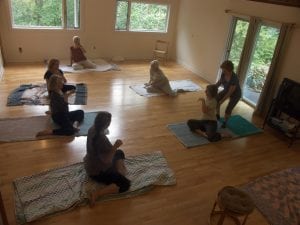Feldenkrais Method is one of several body/mind practices to be presented at Garrison Institute’s summer retreat
by Alison Rooney
The Garrison Institute hosts many retreat weekends each year, many designed for specific interest groups. Every so often, though, they expand their offerings in order to expose those interested in mind/body practices in a broad sense an opportunity to learn what each offers, specifically. That’s what will be happening at their “Embodying Practice: A Special Summer Retreat” weekend, Aug. 12 to 14. During the course of these three days, five practitioners, four of whom live and work locally, will be explaining their form, then conducting workshops, guiding attendees in a hands-on way.
Those presenting include Philipstown’s Ron Hershey, who will be teaching “Breath Body Mind” which combines ancient and modern techniques to relieve stress and improve physical and emotional well-being; Teresa Peppard, teaching the art of Tai Chi Ch’uan, a moving meditation practice that harmonizes body, mind and spirit in the practitioner. Rooted in the martial arts, Tai Chi is also a study in relationship to self, the environment and to others; and Richard Villella, co-owner of Cold Spring’s Living Yoga, who currently has a thriving yoga practice helping people with pain and aging-related problems which have resisted traditional western medicine cures.
Also participating is Ann Herington, a mindfulness meditation teacher, retired business leader, mother, partner, food enthusiast, and recent transplant to the Hudson Valley. She will be offering mindfulness meditation instruction.

Garrison’s Mary Newell will also be on hand, discussing perhaps the least-known (at least in this part of the country — it’s much more widely practiced on the West Coast) of the disciplines, the Feldenkrais Method (FM). Newell, whose large studio is surrounded by woodland views, calls FM a “lab for learning a better way of moving. It employs movement with awareness to improve the quality of actions. By focusing attentively on sensations as you move through a coordinated sequence of movements, you learn to eliminate tensions and find greater ease and range of movement with improved flexibility and coordination.”
FM is based on the dynamics of the brain and nervous system as it relates to movements, including breathing. Newell describes her FM classes as “attending to the details of movement to clarify for your brain what would be a better option. The idea is to attend very specifically to all the sensory changes that are happening during the movement, using the part of the brain which relates to movement in two ways, sensory and motor. FM helps you to unlearn things … knowing before the pain tells you. It’s about introducing into the sensory cortex what is possible and more effective so that your brain will remember it; it’s not cognitive learning. The hope is that this will become semi-automatic, that the information will come learned. And that’s the job of both the practitioner and the client, to create independent learning.”
Newell, similarly to other FM practitioners, works with clients in both individual and group class settings. In group classes, everyone works with movement “patterns” which allow for individualization. In the one-to-one context, most useful for those who are in acute pain from a recent incident or who have serious chronic disorders but also for those who simply want targeted, individualized attention to a particular issue or goal, Newell works with the client to determine their goals. “It’s not arbitrary; we’ll figure out how you can get moving toward the experience you want to have. I look at the ‘presenting problem’ in the context of the whole person — their physical capabilities, limitations and activity level, as well as their life goals.”
For some this relates to a long-term or recent injury or condition, such as back pain or a stroke — even with people whose professional lives include using their bodies in what are unnatural conditions, violinists being an example. “It’s the whole person … Finding that clarity through each person and making a meaningful change for something that matters to them.” Above all, everyone is encouraged not to over-extend. “It’s my job to notice when someone is trying to do too much. My skills are in looking, observing and teaching at a rate the person can learn. Sometimes it’s like a good meal — you may want to give a person all the great things in your fridge, but they’ll wind up with indigestion,” Newell states.
Clients are referred to Newell by doctors, physical therapists and chiropractors, as well as through other practitioners, as “Feldenkrais is not an either/or with other modalities. For instance, it’s great in combination with yoga and Tai Chi.”

Newell is a certified practitioner of FM and a writer. She has a Ph.D. from Fordham, as well as two M.A.s: one from Columbia University in English and the other from Teachers College, Columbia University in Movement Sciences. She has taught at Fordham, West Point, Queens College and elsewhere. Currently she offers individual sessions, classes and workshops at her studio; visit flexible-comfort.weebly.com for details.
The “Embodying Practice” retreat is designed to “appeal to those looking to align their bodies, hearts and minds in the serenity of a contemplative environment,” according to Garrison Institution notes, which also describe the weekend as an opportunity to “spend quiet time in your personal spiritual practice. Practice how to become more aware of the body and trust in its innate wisdom.” The weekend will begin with a panel discussion with all of the instructors discussing the practices they will be teaching. The instructors will also be on hand at mealtimes and other times to talk further with participants. There will be a hike with a local Garrison guide and on Saturday evening, a campfire round the fire pit. All sessions will be held in the Main Meditation Hall.
Fees for the retreat are $280 for a commuter rate for those attending the daily sessions, $390 for a double room and $420 for a single room. Register at garrisoninstitute.org.
